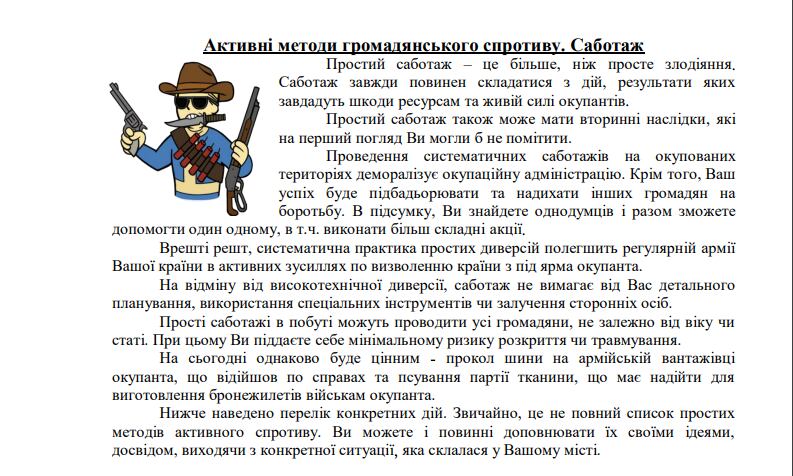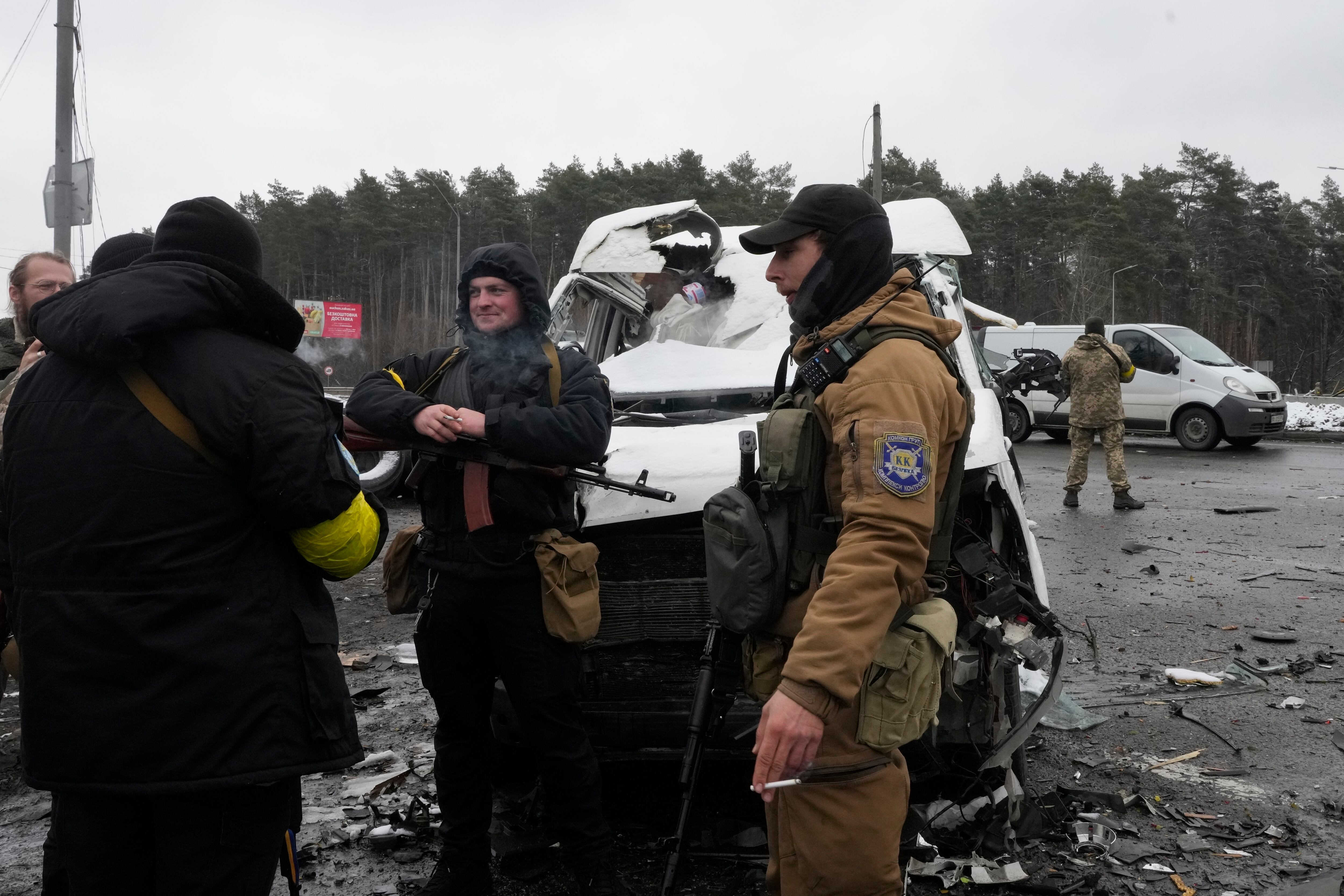In recent days, Ukrainian officials and citizens have made it clear: even if the country does fall to Russia’s massive invasion, the fight won’t stop there.
“It is high time to proceed to resistance!” said defense minister Oleksiy Reznikov in a March 2 Facebook post. “I appeal to the citizens who are in the territories temporarily occupied by the enemy. With your help, our army will quickly defeat and drive out the occupiers.”
“Hunters. Foresters. You know every path…in your area,” Reznikov said, adding that guerillas should “leave the [Russian] tanks” and target logistics convoys. “The enemy must feel that every step without invitation on Ukrainian soil may be his last.”
Ordinary Ukrainians near or behind enemy lines appear to be listening, resisting through both violent and non-violent means.
For some officials, that means everything is going to plan.
Since 2018, U.S. and European officials have quietly helped Ukraine implement key portions of a total defense framework that military officials call the “Resistance Operating Concept,” according to a U.S. special operations official who requested anonymity to discuss the project with Military Times. The work took place over time, through interagency meetings in Kyiv and with multinational representation, the official explained.
Special Operations Command-Europe was unable to grant Military Times interview requests for resistance experts due to the ongoing conflict. The Pentagon has adopted a restrictive media posture on the war in Ukraine, denying media embed requests and conducting routine intelligence updates on background.
From civil to violent resistance: the ROC and Ukraine
The Resistance Operating Concept centers around building up the capacity of NATO members and friendly countries to mount an effective civil and military resistance if they were to face Russian invasion.
The ROC also encourages civil disobedience and non-violent resistance in the face of enemy occupation.
Nations supported under the ROC are encouraged to develop the legal and organizational framework for a resistance and bring it under the official control of their armed forces. That makes it easier for resistance forces to receive external training, funding and weapons.
Ukraine’s total defense project, which is part of a U.S.- and NATO-supported defense reform collaboration that has been ongoing since war began in 2014, resulted in such a framework last year — and not a second too soon.
“The ROC did help Ukraine self-evaluate [their national defense plan]...and it generated some momentum for Ukraine to catch up with their neighbors in that proper legal structure,” explained the U.S. special operations official familiar with the country’s resistance planning. The official added that other countries have also implemented lessons from Ukraine’s combat experience against Russia in the Donbass region.
Kyiv’s legislature passed “On the Fundamentals of National Resistance” in July, according to a release from president Volodymyr Zelensky’s office. The legislation included “important measures aimed at developing territorial defense and [a] resistance movement, and introducing a system of preparing the population for national resistance.”
It also offers legal protections for any civilian in Ukraine who takes up arms against an occupying force, while offering the government options for disavowing or blocking counter-productive resistance.
The law also placed Ukraine’s highly capable SOF units — who have trained extensively with U.S., Canadian and European troops since 2014 — in charge of building out and coordinating insurgent forces in the event of occupation.
It’s not clear yet whether Ukrainian SOF are organizing and leading insurgent forces amid their ongoing ambushes and raids against Russian columns. But early signs of resistance are appearing as Western nations flood the country with man-portable anti-tank and anti-aircraft weapons.
One of many widely shared videos out of the conflict zone depicts a drive-by Molotov cocktail attack on a disabled Russian vehicle under tow.
Videos emerging from Kherson, one of the few cities currently under Russian occupation, show a restive population that regularly protests and impedes occupation forces. One video even showed protestors brawling with Russian troops as a hail of warning shots sounded in the background.
Citizens in Energogar, another town in southern Ukraine, delayed a Russian advance on the town’s nuclear power plant when hundreds of residents blocked the road with vehicles, barricades and their own bodies.
Training materials anytime, anywhere
Ukrainian officials are doing their best to fan the flames, too.
A new official website — the “National Resistance Center” — run by Ukraine’s Special Operations Forces offers advice and handbooks for would-be insurgents of all stripes. It also disseminates “fresh news” daily on protests and resistance actions in Russian-occupied areas of the country.
The website includes how-to guides on reporting Russian troop movements, tactical medicine, secure communications, sabotage and more.
A 19-page “pocketbook” consolidates much of the training material into a single PDF document illustrated with various images of Vault Boy, a symbol from the Fallout video game series where players navigate a post-apocalyptic world through smarts and sabotage.
Notably, the website also instructs everyday citizens on how they can resist Russian occupation without taking up arms.

One page instructs office workers in any future Russian occupation administration to “work as slowly as possible,” spread “alarming” workplace rumors, “do your job badly” and misplace documents.
Implications beyond Ukraine
The adoption of total defense isn’t unique to Ukraine, though the Eastern European country of more than 40 million is poised to be a test-case of these principles in action.
In recent years, other countries across Europe have quietly updated their national defense plans to lay the groundwork for an insurgency in the case of Russian invasion and occupation.
Countries at the vanguard of resistance planning include Poland, the Baltic states of Estonia, Latvia and Lithuania; the Nordic countries of Finland, Norway and Sweden; and other vulnerable states, like Georgia.
Ukraine, should its government fall, will offer insight on a burning question for these countries — can a country plant the seeds of insurgency before a full-scale war even begins?

That’s what military planners from countries who have invested heavily in resistance capabilities are closely monitoring, explained the editorial director of West Point’s Modern War Institute, John Amble, in a recent article.
“Ultimately, the questions are whether civilian resistance is a credible means of defending against aggression and, if so, what balance between such an approach and conventional capabilities is appropriate,” Amble explained. He noted that the effectiveness of such efforts thus far “remain unknown in an operational sense but have certainly been symbolically powerful.”
Ukraine is considered one of the countries best-suited for armed resistance among ROC adherents due to its combat experience in the country’s east, explained the special operations official familiar with the country’s resistance planning.
If resistance can’t succeed there, some worry it won’t succeed anywhere — though Ukraine can’t rely on NATO military intervention like many other ROC-inspired militaries can.
Meanwhile, planners supporting Ukraine are preparing for what could be a protracted fight.
According to the Washington Post, Ukraine’s partners “are planning how to help establish and support a government-in-exile, which could direct guerrilla operations against Russian occupiers” in the event that Kyiv and other cities fall and make continued conventional warfare untenable.
“We must win the war,” said one Zelenskyy advisor to the Washington Post. “There are no other options.”
Davis Winkie covers the Army for Military Times. He studied history at Vanderbilt and UNC-Chapel Hill, and served five years in the Army Guard. His investigations earned the Society of Professional Journalists' 2023 Sunshine Award and consecutive Military Reporters and Editors honors, among others. Davis was also a 2022 Livingston Awards finalist.





